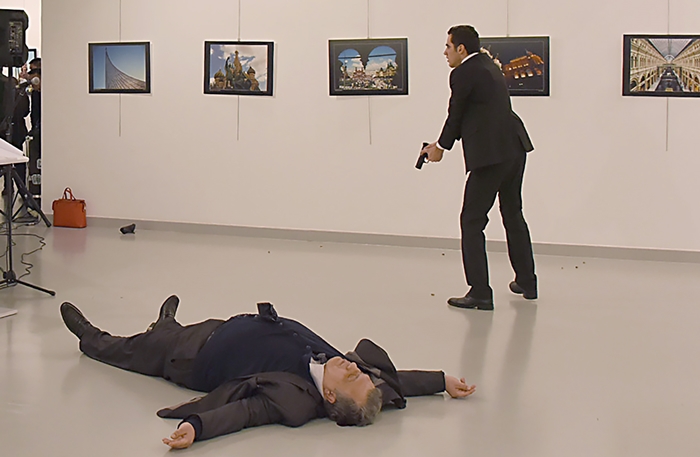Jaish al-Fatah, an umbrella organization that encompasses the al-Qaeda-linked al-Nusra Front, has reportedly claimed responsibility for the murder of Russian Ambassador Andrey Karlov by a Turkish policeman in Ankara on Monday evening.
The terrorist group claimed responsibility via a letter which appeared on the Internet. The letter was written in Arabic and has yet to be confirmed.
In its statement, the group said “one of the heroes of the Jaish al-Fatah, Mert Altıntaş carried out the execution of Russian Ambassador Andrey Karlov in Ankara,” because the world remains silent to what is taking place in Aleppo, no support comes to the Muslims in the Levant [an old term referring to countries of the eastern Mediterranean] and for the victory of the Syrian people.
Twenty-two-year-old Mevlüt Mert Altıntaş shot Karlov to death while the ambassador was giving a speech at an art gallery. Turkish media reports said Altıntaş entered the art gallery without undergoing a security check as he showed his police ID.
Jaish al-Fatah wrote the name of Karlov’s killer in big letters as “Martry Mert Altıntaş.”
Signaling similar attacks in the future, the group also said the assassination of the Russian ambassador was the “first act of revenge” for the women, children and the elderly killed in Aleppo as well as all the Muslims killed across the world.
Immediately after the ambassador’s assassination, Turkish government officials and the pro-government media circles pointed to the faith-based Gülen movement as the mastermind of the attack.
Pro-government media outlets ran stories suggesting that Altıntaş went to a Gülen-linked university preparation course and that some of his relatives worked at Gülen-linked organizations.
The Turkish government has been waging an all-out war against the movement since the outbreak of a corruption scandal in late 2013. The government’s crackdown on the movement reached new heights with a failed coup attempt on July 15 as the government held the movement responsible for the coup attempt. The movement strongly denies having any role in the failed coup.
Turkish Foreign Minister Mevlüt Çavuşoğlu even told his US counterpart, John Kerry, in a phone conversation on Dec. 19 that both Turkey and Russia “know” that the Gülen movement was behind the ambassador’s murder.
However, in a statement early on Wednesday, the Kremlin said it was too early to conclude who was behind the murder of the Russian ambassador to Ankara.
In the meantime, one of the advisers of Turkish-Islamic scholar Fethullah Gülen, whose views have inspired the Gülen movement, strongly denied allegations by an unnamed senior Turkish security official of “very strong signs” that the gunman who killed the ambassador belonged to Gülen’s movement.
Allegations by an unnamed senior Turkish security official are “laughable” and intended to cover up lax security, the adviser, Alp Aslandoğan, told Reuters on Monday.
In another statement on Monday, Gülen condemned the assassination of Russia’s ambassador to Turkey as a “heinous act of terror” and urged the Turkish government to identify anyone who aided the gunman.

